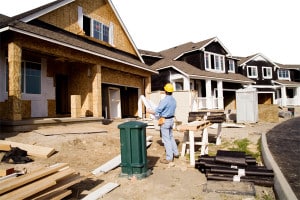Home prices in Boston and across the suburbs are hitting new highs once again, fueled in large part by a steady, decades-long decline in new construction. So it’s nothing short of astounding that Gov. Charlie Baker’s proposal to boost the construction of “starter homes” is the first measure of its kind on Beacon Hill in recent memory.
This long-standing lack of interest in the halls of state government in what was once a staple of middle class life speaks volumes. It not only highlights just how completely messed up the Massachusetts housing market has become, but also the challenges ahead for Baker, intent on building an image as a kind of troubleshooting “Handyman-in-Chief,” ready to tackle our state’s most stubborn functional issues.
“When you come to school here from Pennsylvania or North Carolina or the Midwest and you want to buy a home, you have to spend an enormous amount of money for a house that is functionally obsolete,” said Benjamin Fierro, a Boston attorney who has represented the local home building industry for years.
“We believe there is an enormous market out there,” he said.
Baker’s proposal is fairly modest given the scale of the housing shortage we face and the entrenched local opposition to pretty much anything with four walls and a roof, but we will get to that later.
As part of a larger economic development package, our governor wants to entice suburbs and towns across the state to create “starter home” zones for smaller homes affordable to first-time, middle-class buyers.
Homes in starter home districts would be limited in size to 1,850 square feet – roughly the footprint of all those split-levels, Capes and Colonials built in the ’50s and ’60s. The lot size would also be limited to 10,000 square feet, or a quarter of an acre.
By putting a size limit on these new homes and their lots, the hope is it will keep their prices in the high $300,000s to low $400,000s – what counts for starter home pricing these days.
Local builders and their representatives met with the Baker Administration to help hash out the proposal.
But what’s in it for the towns? For their participation in the program, building starter homes and denser, so-called “smart growth” districts, local officials will get a “production bonus” and a share of the $25 million Baker has made available.
 Why Now?
Why Now?
It all sounds so reasonable it’s hard to understand why we didn’t see a big push for something like this in 2006 or, for that, matter, 1996.
After all, new home construction has fallen steadily since the 1980s, the last time Massachusetts built homes at a rate in line with the national average. The number of new single-family homes built has continued to dwindle over the past few years, even as the local economy has kicked into overdrive.
Home prices, in turn, have risen correspondingly, with bidding wars for scarce listings driving up values to ever crazier levels, especially inside Route 128.
Yet while there has been interest on the part of state lawmakers and governors past in spurring construction of more rentals, the idea of trying to revive the old fashioned starter home, nearly extinct now in Massachusetts, has mysteriously been a much harder sell.
In particular, the Home Builders and Remodelers Association of Massachusetts tried hard to get Gov. Deval Patrick interested in starter home legislation a decade ago, to no avail. Patrick’s focus was on the trendier idea of boosting more apartment construction around rail stations and transportation hubs; suburbanites struggling to buy their first home apparently weren’t high on his agenda.
Some of this is in line with the new, now conventional thinking that starter homes out of the ’50s and ’60s just aren’t of interest to buyers anymore, especially to up-and-coming Millennials.
Rather, 20- and 30-somethings may not want to buy at all, but would rather rent in some hip urban ZIP code.
It’s a gross oversimplification that confuses necessity with desire. Sure, some Millennials want the urban lifestyle; other surveys have also found a strong interest in homeownership. But the opportunities for pursuing that dream are increasingly constricted thanks to a toxic combination of student debt, high prices and a shortage of new construction in affordable price ranges.
Fierro, the long-time attorney for local builders, noted his Millennial daughter scoffs at the idea being floated by some housing experts that dorm-like “Millennial villages” should be built across Boston.
“My daughter says ‘I don’t want to go back and live in a dorm – I want to be a grownup and live in a house,’” Fierro said.
Politics may be at play here as well. Right now, there is no longer any solid, easily organized political constituency lobbying for more modestly priced new homes other than the developers who want to build them.
Big apartment projects with lots of subsidized apartments speak to the activist base of the Democratic Party in a way in which visions of ’50s-style suburban starters homes do not.
Yet the mainly Republican suburbs where started homes were once built by the thousands aren’t keen on the idea, either.
Many of these suburbs have grown rich over the decades and aren’t necessarily all that interested in opening the door to smaller homes to be sold to buyers of more modest means.
After all, Capes and ranches are endangered species in suburbs like Needham and Newton, being torn down by the hundreds to make way for oversized million-dollar homes.
Most suburbs in the Boston area also have ridiculous lot size requirements of 1, 2 or 3 acres, ensuring that any new home built will be well beyond the reach of any mere middle-class buyer.
But while frustrated young homebuyers aren’t a powerful political pressure group, they are vital for the future of the Massachusetts economy.
A smart man, Baker certainly realizes this – economists have been warning of demographic disaster for years now as middle-class families flee to more affordable states.
The big question now is whether the governor’s rather mild prescription for our state’s now chronic housing crisis stands a chance of working.
The proposal is all carrot and no stick – conspicuously lacking is any penalty or consequences for suburbs which go their merry way and keep zoning out all but the wealthiest of homebuyers.
Maybe, just maybe, one or two towns will buy into the idea and start a trend; you can never count out a miracle, I guess.
But after years of NIMBY opposition in Boston’s suburbs to any new housing except for the extremely wealthy, it seems a little late for gentle prodding.








